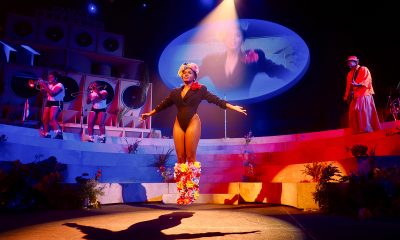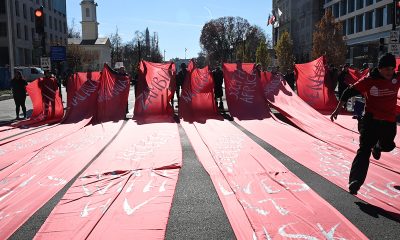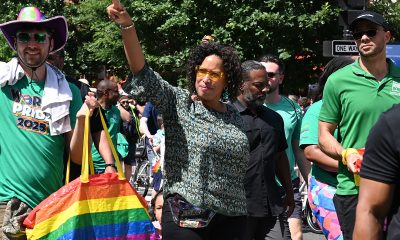Arts & Entertainment
Queen of everything
Boy George chats up his new album, tour and how he got his mojo back
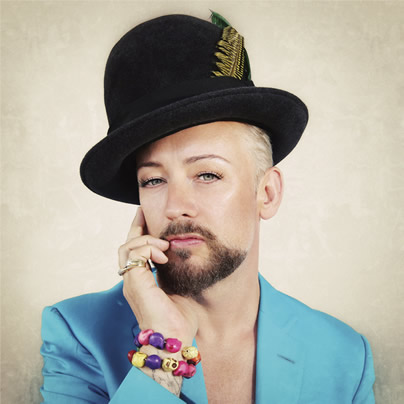
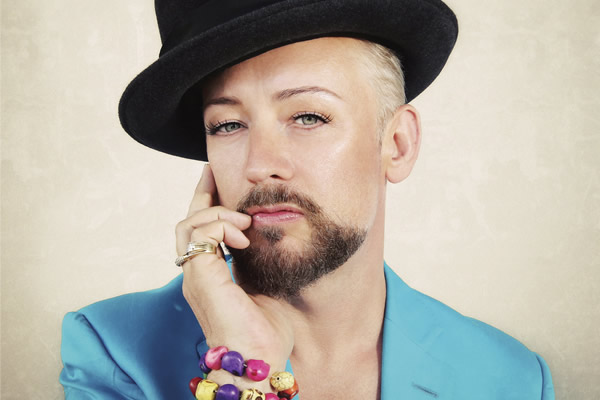
Boy George says in some ways straight acts can experiment with gender more than gay artists. (Photo courtesy High Rise PR)
Boy George
Monday, April 21
9:30 Club
815 V St. N.W.
930.com
$35
Doors open at 7 p.m.
Boy George is the first to acknowledge a cliché.
Getting sober in 2008 and turning 50 two years ago are big “take stock” moments for many and no less so for him.
“It was a huge turning point for me,” he says of his milestone birthday. “I thought, ‘I’ve got to get my shit together, I’ve got to focus, this is important.’ I just felt I’d wasted a lot of time. I looked at myself and thought, ‘God, I’ve done nothing.’ I know I’ve done a lot, I’ve always worked. I’ve grafted and always made money, but a lot of it was pointless because no one knew what I was doing.”
This year, the world is seeing the fruit of those epiphanies. His new album “This Is What I Do” was out in the UK last fall and officially drops in the U.S. with three bonus cuts on March 25. The last several years have seen him release a spate of side projects of various scope, but this is his first full-fledged solo album since 1995’s “Cheapness and Beauty.” He starts a U.S. leg of his tour on April 18 in Philadelphia and plays D.C.’s 9:30 Club on April 21.
During a Saturday afternoon phone chat from his London home last weekend, George — in his ever-delightful, clipped British accent — was chatty, self deprecating, quick to laugh and balked or sidestepped no questions. His comments have been slightly edited for length.
WASHINGTON BLADE: I know you’ve been DJing a lot and working on various things, but how did it work out that you released a new album at this time? Why now?
BOY GEORGE: Well, you know, as you said, I’ve been DJing very happily for the last 25 years and I haven’t really had a record deal for a long time. I suppose I have thought about making records but, you know, I wasn’t sure how I was going to do it. You know, whether I was going to sign with a major label or do something more independent. I also changed management a couple of years ago and wanted to kind of start fresh with a bunch of people that perhaps could kind of see beyond what I was. I think when you’ve had a very, very successful career like I had in the ‘80s, people tend to kind of hope you’re going to try and repeat that. They’re always waiting for you to write the next “Karma Chameleon,” but it’s never going to happen (laughs). Everything I’ve ever done has been kind of instinctual and impulsive and spontaneous and I’ve never really been the kind of artist that can kind of just pull it out of a hat. I have to feel it. … I just felt it was the right time. We discussed the different ways I could go about making a record and I decided to be brave and pay for it myself and own it myself which is a new thing for me, kind of a grown up move. And so far, you know, it’s been the right choice.
BLADE: When was it recorded and how long did it take?
GEORGE: We started about March last year and we did it within about four months. Not solidly. We recorded and then somebody else mixed it. I would say about four to five months last year.
BLADE: How was the reception in the UK last fall?
GEORGE: We’ve had amazing reviews. Comeback of the year, Boy George has finally got his mojo back, you know, blah, blah, blah. Lots of compliments. I mean, much to my surprise really, because I wasn’t really sure what kind of reaction I would get. I wasn’t sure what to expect. So yeah, everything in the UK has been kind of another surprise. England tends to get much more excited about Beyonce than anything that comes from here. It’s like all America, America, hip-hop, Beyonce, Lady Gaga. Nobody cares about Boy George anymore (laughs). That’s why I’m relying on you guys in America.
BLADE: The first single “King of Everything” says “What is the word on the street? Have I lost my crown?” Have you?
GEORGE: Well, the song isn’t just about me, it’s about everyone. It’s about human frailty, people messing up, which is a very human thing, yet it is also about me but it’s about you, it’s about everyone. It’s not literal. The crown is a metaphor. If it was about me, I’d call it “Queen of Everything.”
BLADE: How did the UK tour go last fall?
GEORGE: It was amazing. Very small, very affectionate and the audiences were adorable. They were mostly the kind of hardcore fans, so they were really affectionate.
BLADE: About how long do you usually play?
GEORGE: It depends on the curfew. We do about an hour and a half, maybe two hours. Not quite Bruce Springsteen-length. But we play for as long as we can. When you’re doing a show, sometimes if the mood is right, you can keep it going, depending on the audience reaction, really. But obviously some venues have a curfew so you can’t play longer than a certain time.
BLADE: About how much of the new album do you work into the set list?
GEORGE: We kind of try and balance it with things people know, some things people haven’t heard, some new stuff, some old stuff. You know, I’ve been doing this a while and one thing I’ve continued to do is to play live. At the end, you have to figure out a way to reach the audience.
BLADE: How does the new stuff sit with the Culture Club hits? Is it hard to build a set list that flows?
GEORGE: No, I don’t think it’s difficult. With the things people know, you’re always in a very safe area. If you sing a song that’s been a hit, that’s very safe so no, I wouldn’t say it’s difficult. There are certain songs that I don’t do. Obviously with that kind of a back catalogue, there are some songs you grow into and some that you say, “OK, this doesn’t really speak to who I am anymore.” So you kind of try to mix it up and keep it interesting, not just for the audience but also for yourself. You don’t want it to be a kind of robotic show that’s the same every night. Myself and John, who plays guitar in my band, we have sections where we do acoustic stuff and we can do all sorts of things there and change things around and do new things. That helps keep the show exciting.
BLADE: Do you still have the goatee?
GEORGE: I do.
BLADE: Your look at present seems more kind of genderfuck than androgynous. Just a whim or do you feel more comfortable with mixing in masculine elements than you have in previous years?
GEORGE: I just had some time off and didn’t shave for a few days and kind of looked at myself and thought, “Oh, I quite like this look.” It’s not something I really sat down and thought about. I just kind of grew my beard when I was on break and other people seemed to like it and other people didn’t like it, which made me want to keep it more. I might get bored with it at some point but I’m loving it at the moment.
BLADE: Lots of pop stars have played around with androgynous looks — I’m thinking of David Bowie and Prince — and the public seems to accept them as straight. You were always pretty much out for the most part. Do you feel the public overall has pretty good gaydar?
GEORGE: I don’t know really. I think there are some audiences that don’t really want to know, depending on the artist. Sometimes people have this kind of spare-me-the-details kind of attitude. I think it’s more about what kind of artist you are and in what ways you want to affect the audience. That’s the starting point for me. It’s about what’s going to make you happy, do you know what I mean? How much of yourself you reveal. I think it’s much easier for somebody straight to play around with these boundaries because they’re not being defined by their sexuality. If you’re gay, then you’re gay and you have to strike a sort of balance so people don’t feel you’re flaunting it in their face or preaching, you know. I think as a gay artist, you have to walk a much finer line than, say, somebody who’s just having a flirtation with this. I mean, it’s much easier for someone straight like Macklemore to sing a song with the word gay in it. A few years ago I made an album called “Cheapness and Beauty” and there was a song called “Same Thing in Reverse” and I was told categorically this will never, ever get played on the radio because I used the phrase “kamikaze queer” in it. You can get away with more when you’re straight.
BLADE: You’ve talked about making a new album with Culture Club this year. Is that still in the cards?
GEORGE: Yes, we are looking at the possibility of recording some stuff this year but at the moment, we’re kind of still in the writing stages. We’ve had some great sessions and we really did enjoy ourselves and it was a really nice experience. Everybody came away feeling really good about it and, you know, we’re going to see what we can do next.
BLADE: It’s so great to see you looking so good, sounding so good and apparently really thriving. A few of your contemporaries who were also huge in the ‘80s haven’t fared as well. What did you think and feel when you heard Michael Jackson and Whitney Houston had died?
GEORGE: Oh my God, you know, I mean Michael Jackson. And I loved Whitney Houston like so much. I was just a massive, massive fan. I loved her voice. And Michael Jackson, you know, I was at home when it happened and I just remember thinking, “Oh my God, this is so sad.” You know, he was such an incredible artist. For the last few years of his life, I felt like there was so much pressure on him and he looked world-weary every time I saw him. I felt such sadness for him. I was just so sad when he died and Whitney, what a shame for both of them. They were great, great artists. I was a huge Michael Jackson fan and a huge Whitney Houston fan and I’m not ashamed to say I did cry. I thought it was really sad.
BLADE: Conversely does it make you happy when you see some of those artists still doing well today. Like Cyndi Lauper, for instance, just won a Tony.
GEORGE: I’m always happy when anyone does well. That’s a measure of maturity, I think. Cyndi’s a friend. I haven’t seen her for a while, but she’s a great girl and, you know, yeah, I think when you see your contemporaries doing well, it gives you hope. You think, “OK, anything’s possible.”
BLADE: You recognized early on that fame was fickle and I remember you telling Johnny Carson you knew staying at that level at the height of Culture Club was not sustainable and that you envisioned yourself eventually writing songs for other artists and doing other things. How has that played out differently than you thought it might have when you were 22?
GEORGE: Oh, I think when you’re 22 you really think you know it all, don’t you? (laughs) You listen back to the things you say and you think, “Oh my God, you really thought you knew it all.” And I think at that age, you’re still learning so much. I feel very fortunate to still be doing what I love.
BLADE: Yes, but it struck me as rather insightful that you realized even then that pop careers always ebb and flow.
GEORGE: It may be one of the reasons I’ve done other things. I’ve never wanted to just rest on my laurels. I don’t have the idea of trying to kind of repeat something. So in a way, DJing has been an incredible second career for me. When I first started it, my manager at the time thought it was a really bad idea and told me I shouldn’t do it. But again, I just followed my instincts and it was the right thing to do because it allowed me to avoid nostalgia. I’ve been able to be involved in a quite progressive industry and not have to worry about what I used to be or, you know, the ‘80s, and all that stuff. So I’m really happy that I made that decision. I like to work. I’m a worker and I’m always up for a new challenge.
BLADE: Back in the early ‘90s, the theme from “Crying Game” was this huge out-of-nowhere smash radio hit in the U.S. Do you still sing it live?
GEORGE: From time to time. Actually, maybe that’s a good one to put into the set in America. I’ll write that down.
BLADE: Is it harder to break a song in the U.S. now than it was years ago? Not even with yourself, necessarily, but just in general?
GEORGE: I don’t know what it’s like now because I’m not involved in that kind of trying to have hits, you know. I think past a certain age, you’re just kind of marginalized in the world anyway.
BLADE: Does that bring with it artistic freedom?
GEORGE: I think it does. Once you kind of get over the shock and the horror that certain radio stations won’t play your new stuff no matter how good you are, I mean that’s really the bonkers thing. I’m not sure it’s as bad in America as it is here, but certainly here, it’s just ridiculous. But it kind of remains to be seen. It’s a very different landscape now. Making records is very different and the way we promote ourselves is very different. In a way I’m kind of starting again, so I’ll let you know.
BLADE: How many of the players from the album do you tour with?
GEORGE: All of them.
BLADE: The album has such a lush sound — is that easy to duplicate on stage?
GEORGE: Well, we have a nine-piece band that we’re touring with at great expense so we probably won’t be making any money. But I think it’s really important to have a great band and we had a great time in the UK last year. We do England and Europe then we go to America. We’ll be steaming by the time we get to the states.
BLADE: How long have you been a vegan?
GEORGE: I’m not strictly a vegan but I’m very conscious about what I eat and I don’t eat a lot of dairy, though I do eat some cheeses. I’ve been on a very particular metabolic plan diet for two years that’s all about your hormonal reaction to certain foods so some of the stuff I don’t eat is very random — like pumpkin, kale, onion or lemon. It’s very individual and different for each person. It’s been sort of life changing for me but I don’t really call myself anything because then you eat a piece of cheese and everybody freaks out.
BLADE: And you run too?
GEORGE: Well, I exercise.
BLADE: Is the U.S. version of the album the same?
GEORGE: No, it’s got more songs. I wrote a song called “Turn On a Little Light For Me,” which I wrote especially for the American album and which I love. We were asked by the label to provide some more stuff and I had a couple covers — “Video Games” by Lana Del Rey and the Bob Dylan song “Make You Feel My Love,” but I didn’t just want covers as the bonus content so I wrote a new song too. It’s about hope. A lovely kind of little Dylan-esque kind of song.
BLADE: Thanks for your time.
GEORGE: Thank you.
a&e features
Meet Mr. Christmas
Hallmark’s Jonathan Bennett on telling gay love stories for mainstream audiences
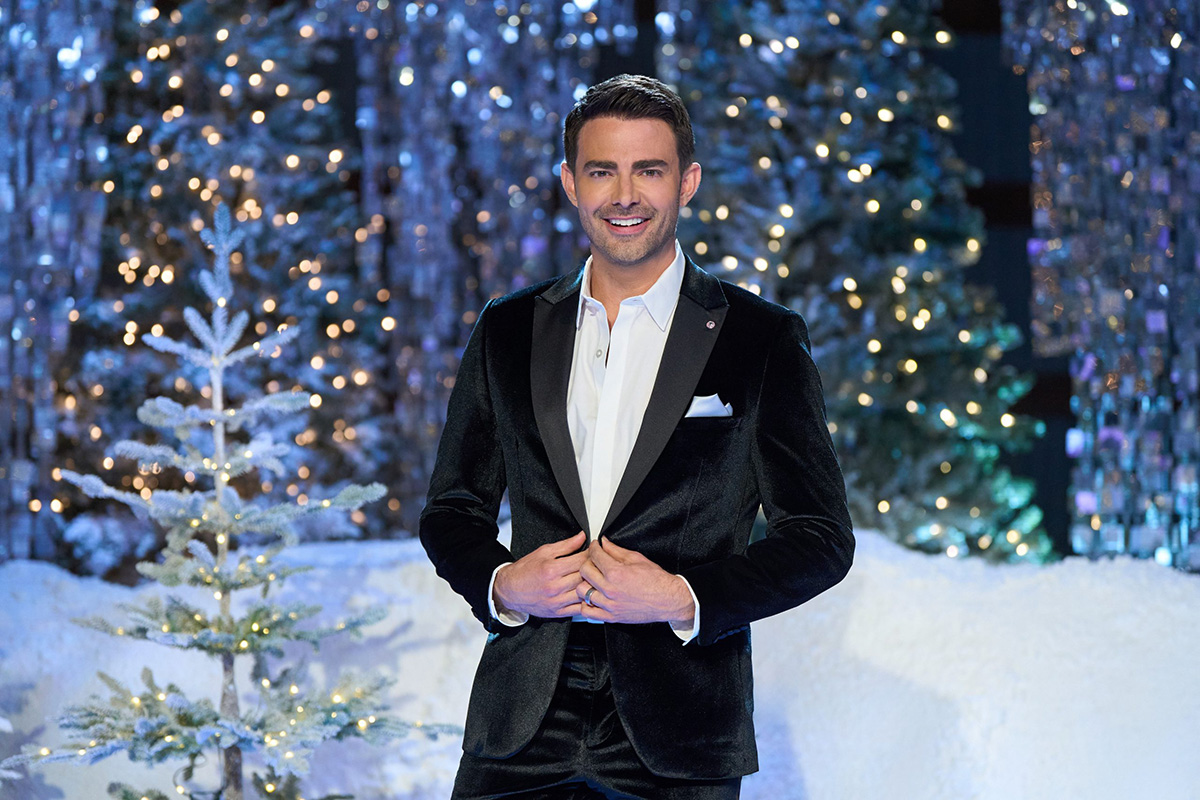
Jonathan Bennett believes there are two kinds of people in the world — those who love Hallmark movies and liars. And in Season 2 of Finding Mr. Christmas, which the Mean Girls star co-created with Ben Roy, Bennett is searching for Hallmark’s next leading man.
“It’s so fun for people because everyone in their life has someone they know that they think should be in Hallmark movies, right? The UPS driver, the barista at the coffee shop, the dentist,” Bennett says. “So we’re testing their acting abilities, we’re testing who they are, but we’re also looking for that star quality — the thing that makes them shine above everyone else. It’s almost something you can’t explain, but we know it when we see it.”
Season 2’s cast includes a former NFL player for the Green Bay Packers, a few actors, and a realtor. The 10 men compete in weekly festive-themed acting challenges, one of which included having to ride a horse and act out a scene with Alison Sweeney. The contestants were chosen from a crop of 360 potential men, and Bennett gives kudos to the show’s Emmy-nominated casting director, Lindsay Liles (The Bachelor, Bachelor in Paradise).
“She has a tough job because she has to find 10 guys that are going to be good reality television, but also have the talent to act, carry a scene, and lead a Hallmark movie eventually,” he says. To be the right fit for a Hallmark leading man, Bennett singles out five key characteristics: you have to be funny, charming, kind, have a sense of humor, and you have to do it all with a big heart.
Of course, Finding Mr. Christmas wouldn’t be Finding Mr. Christmas without its signature eye candy — something Bennett describes as “part of the job” for the contestants. “I can’t believe Hallmark let me get away with this. I dressed them as sexy reindeer and put them in harnesses attached to a cable 30 feet in the air, and they had to do a sexy reindeer photo shoot challenge,” he says with a laugh. “This season is just bigger and bolder than last. People are responding to not only all the craziness that we put them through, but also comparing and contrasting the guys in their acting scenes when we do them back-to-back.”
Season 1 winner Ezra Moreland’s career has been an early testament to the show’s success at finding rising talent. On seeing the show’s first winner flourish, Bennett says, “Now to watch him out in the world, just booking commercial after commercial and shining as an actor and a model, I think the show gave him the wings to do that. He learned so much about himself, and he took all that into his future auditions and casting. He just works nonstop. I’ve never seen an actor book more commercials and modeling gigs in my life.”
Bennett has been a star of plenty of Hallmark movies himself, including the GLAAD-award-winning The Groomsmen: Second Chances, which makes him a fitting host. Among those movies are 2020’s Christmas House, which featured the first same-sex kiss on the network and had a major impact on Bennett’s career as an openly gay man. “Hallmark’s been so great about supporting me in queer storytelling. But again, I don’t make gay movies for gay audiences. I make gay love stories for a broad audience, and that’s a huge difference, right? We’re not telling stories inside baseball that only the gay community will understand.”
He continues, “The backdrop of a Hallmark Christmas movie is very familiar to these people who watch. And so when you tell a gay love story, and you tell it no differently than a straight love story in that space, they’re able to understand. It’s able to change hearts and minds for people who might not have it in their lives.”
While Hallmark has become a major staple of Bennett’s career, he started off wanting to be a Broadway actor. And before the first season of Finding Mr. Christmas aired, Bennett took a break from TV to make his Broadway debut in Spamalot, replacing Michael Urie as Sir Robin and starring alongside Ethan Slater and Alex Brightman.
“That was my dream since I was five years old – then I booked a movie called Mean Girls, and everything kind of changes in your life. You no longer become a person pursuing Broadway, you become a part of pop culture,” Bennett recalls. “And to be honest, when I hit 40, I was like, ‘I’m probably never going to get to live that dream.’ And that’s okay, because I got to do other dreams and other things that were just as cool but different. So I honestly never thought it would happen.”
Bennett is still determined to make his way back on Broadway with the right role — he calls Spamalot the “best experience” of his life, after all — but he’s got another Hallmark show lined up with Murder Mystery House, which he co-created. The show was recently greenlit for development and intends to bring the Hallmark mystery movie to life. “It’s kind of like our version of The Traitors,” Bennett admits.
Looking back on both seasons, Bennett says that what makes Finding Mr. Christmas stand out in the overcrowded reality TV landscape is that everyone involved makes it with heart: “This isn’t a show where you’re going to watch people throw drinks in each other’s faces and get into big fights. The thing that has amazed me so much about this show, the more we’ve done it, is that every season, 10 guys come in as competitors, but they leave as a family and as brothers. That’s something you don’t get on any other network.”
Finding Mr. Christmas airs every Monday on Hallmark through December 20, with episodes available to stream on Hallmark+.
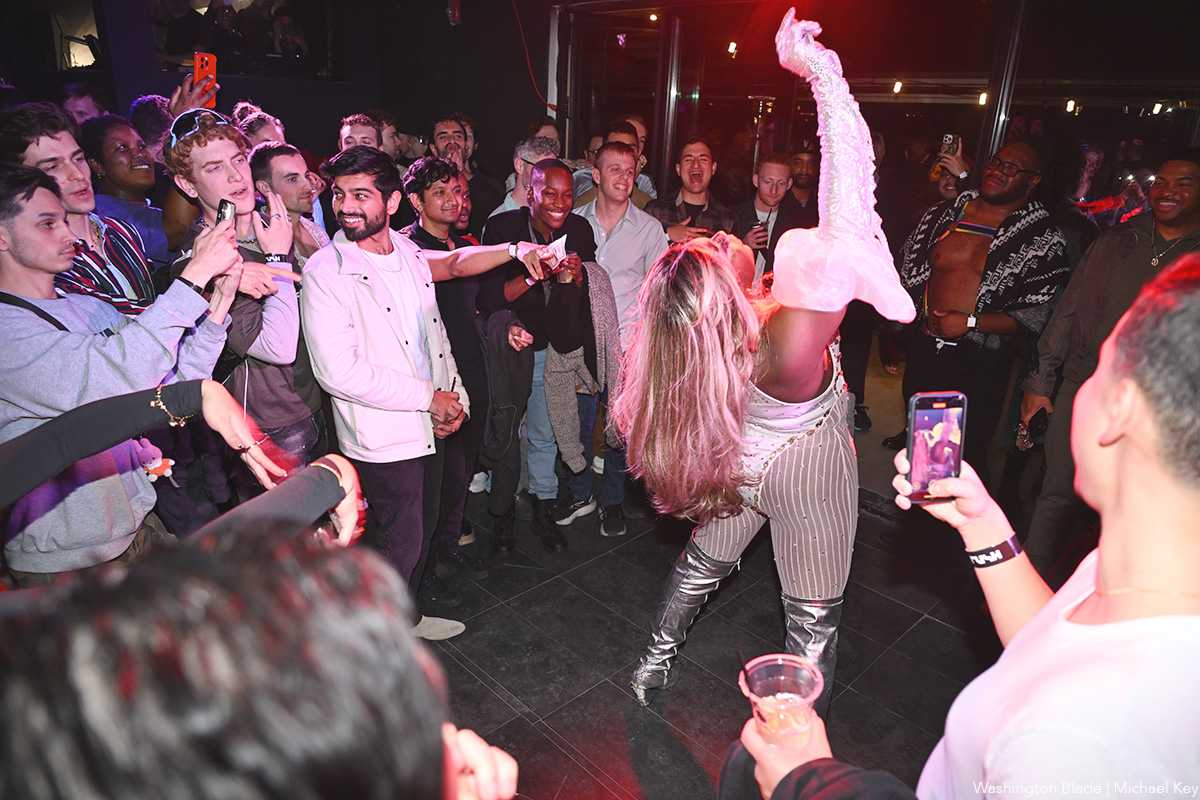
The new LGBTQ venue Rush (2001 14th Street, N.W.) held a preview night on Friday, Nov. 28. Performers included Cake Pop!, Druex Sidora and Tiara Missou.
(Washington Blade photos by Michael Key)
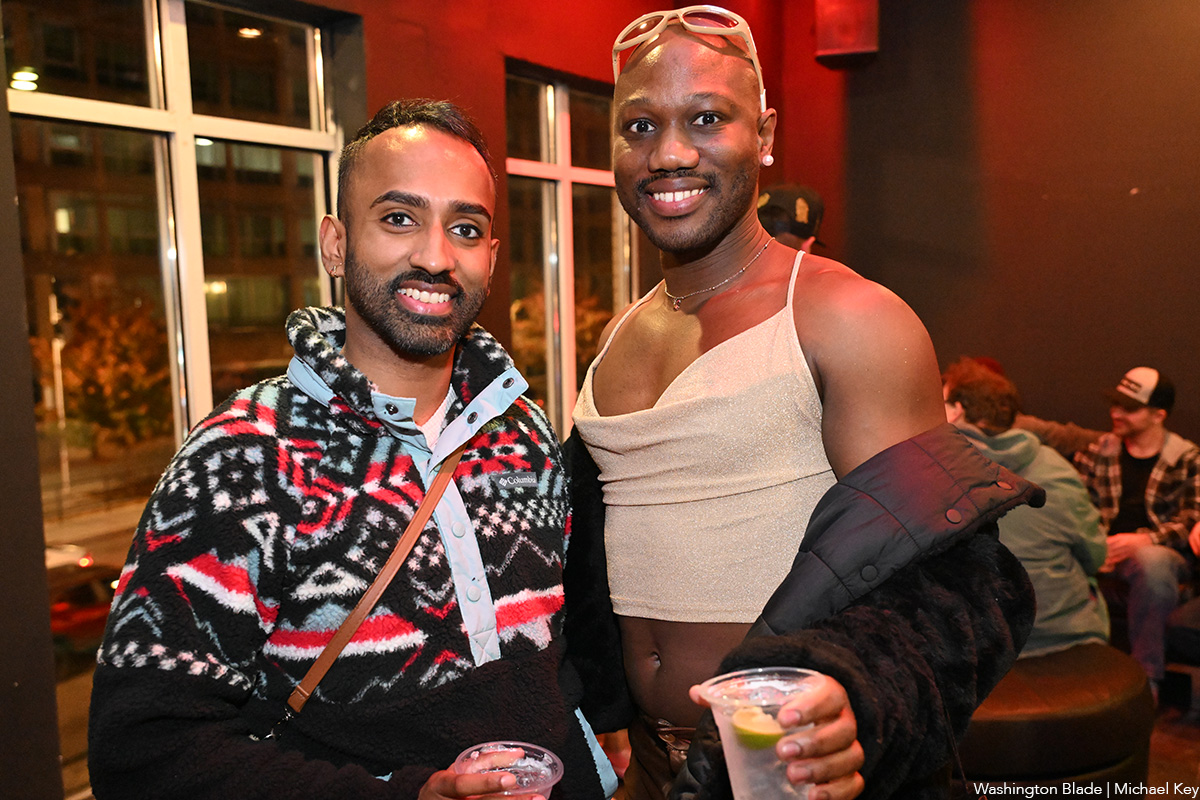
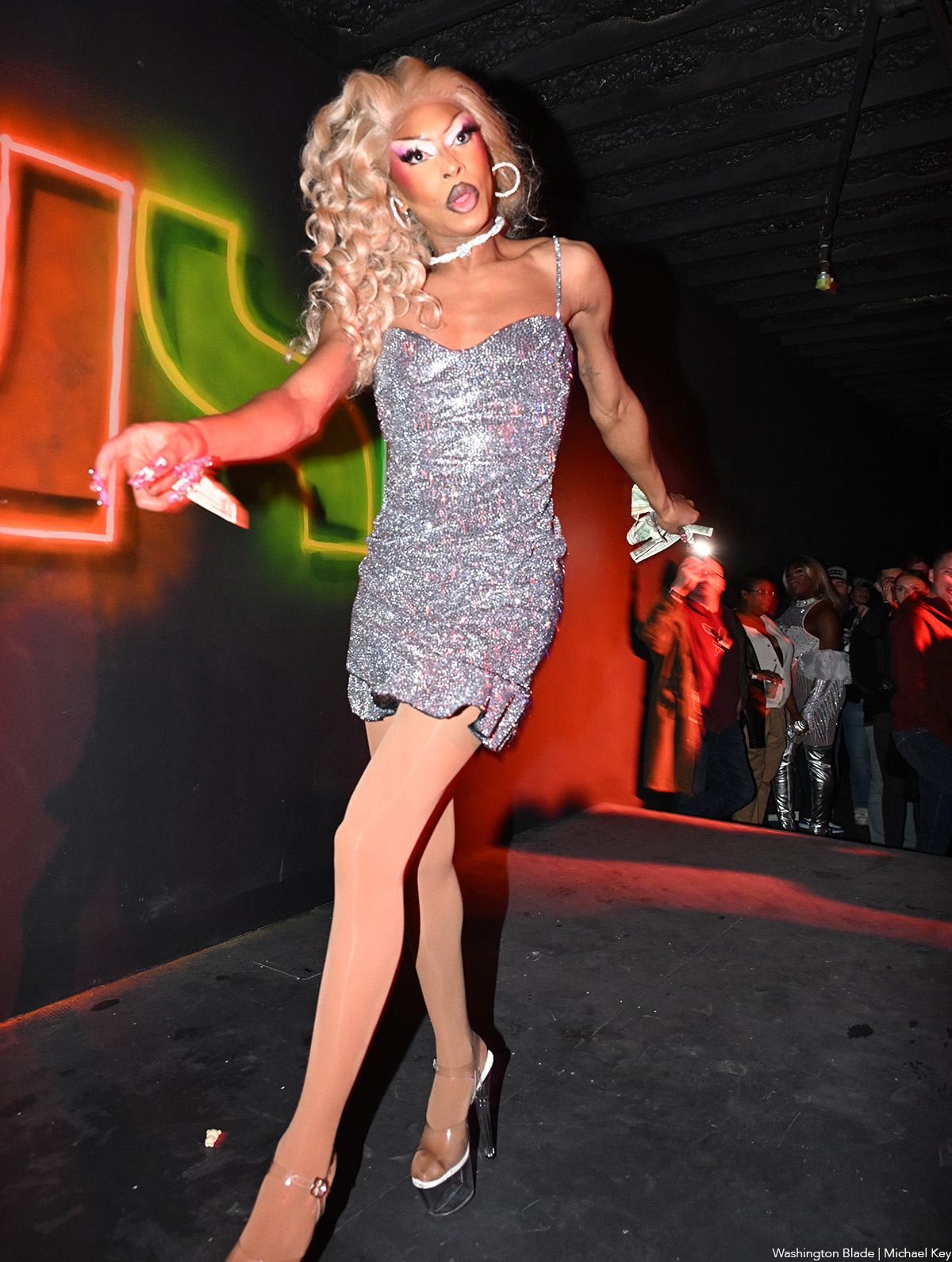
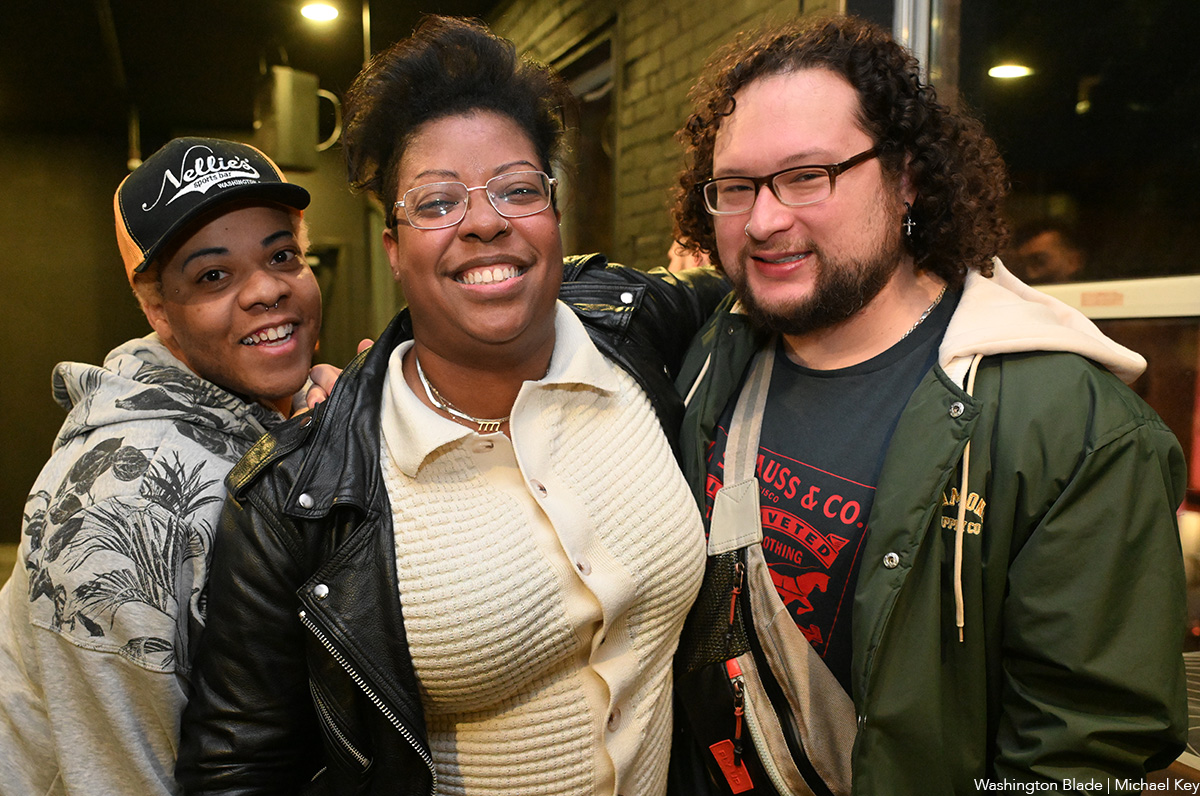
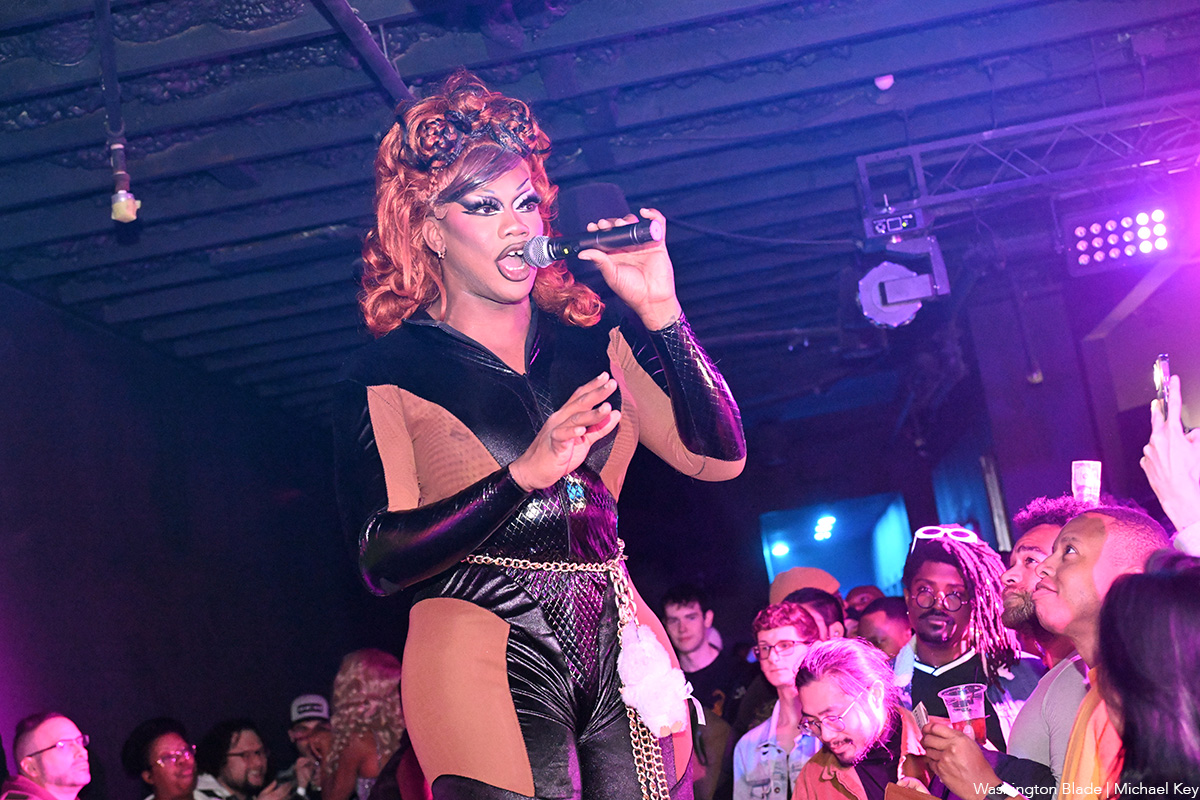
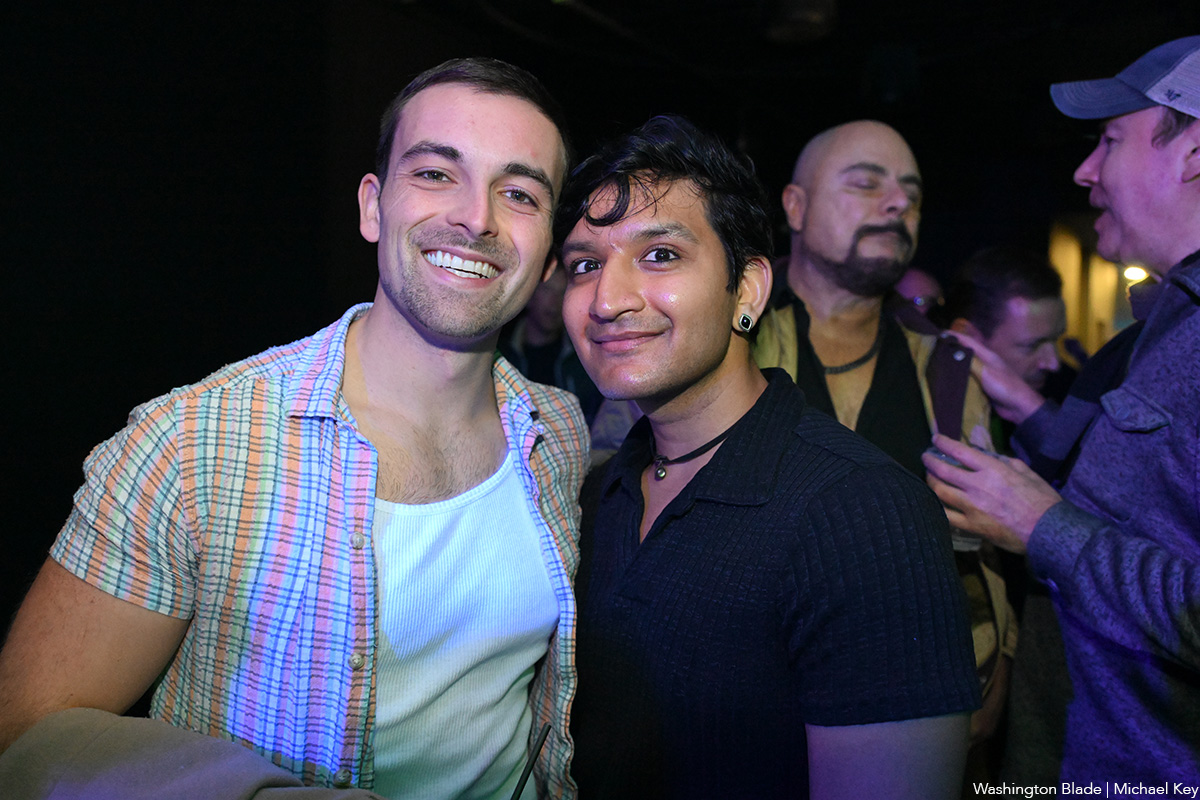
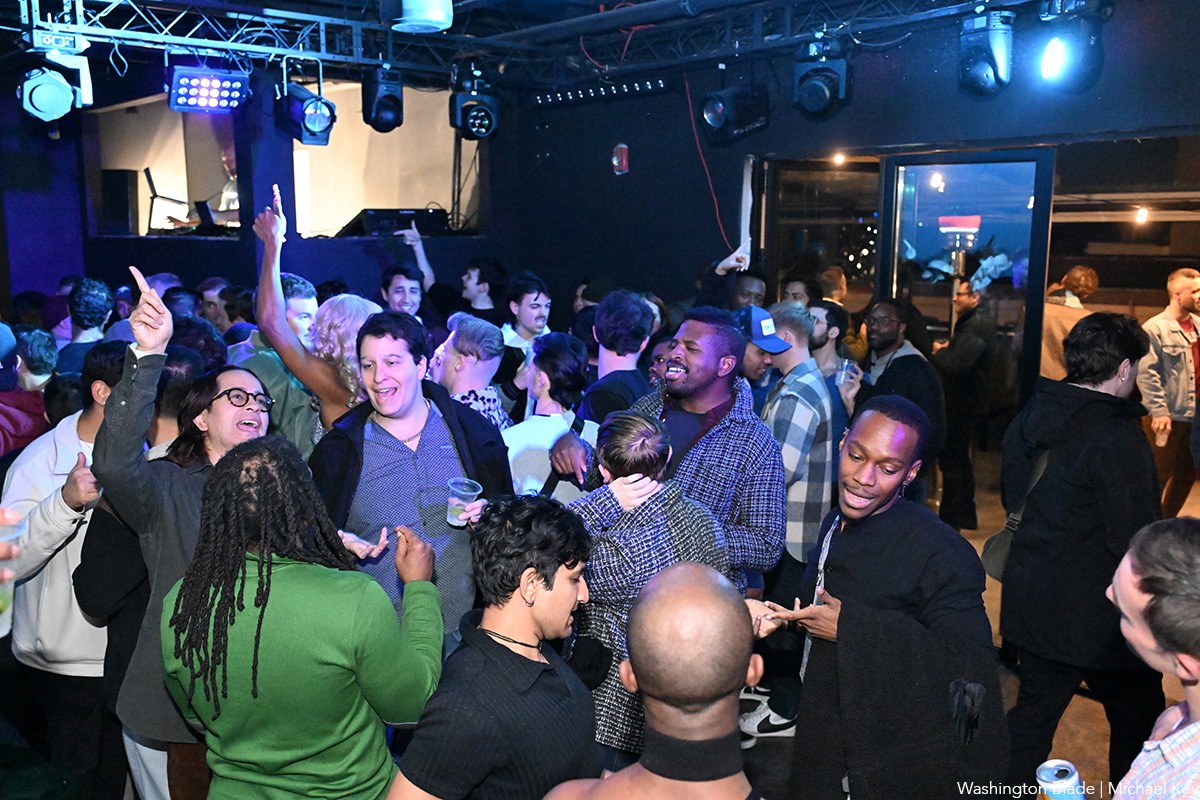
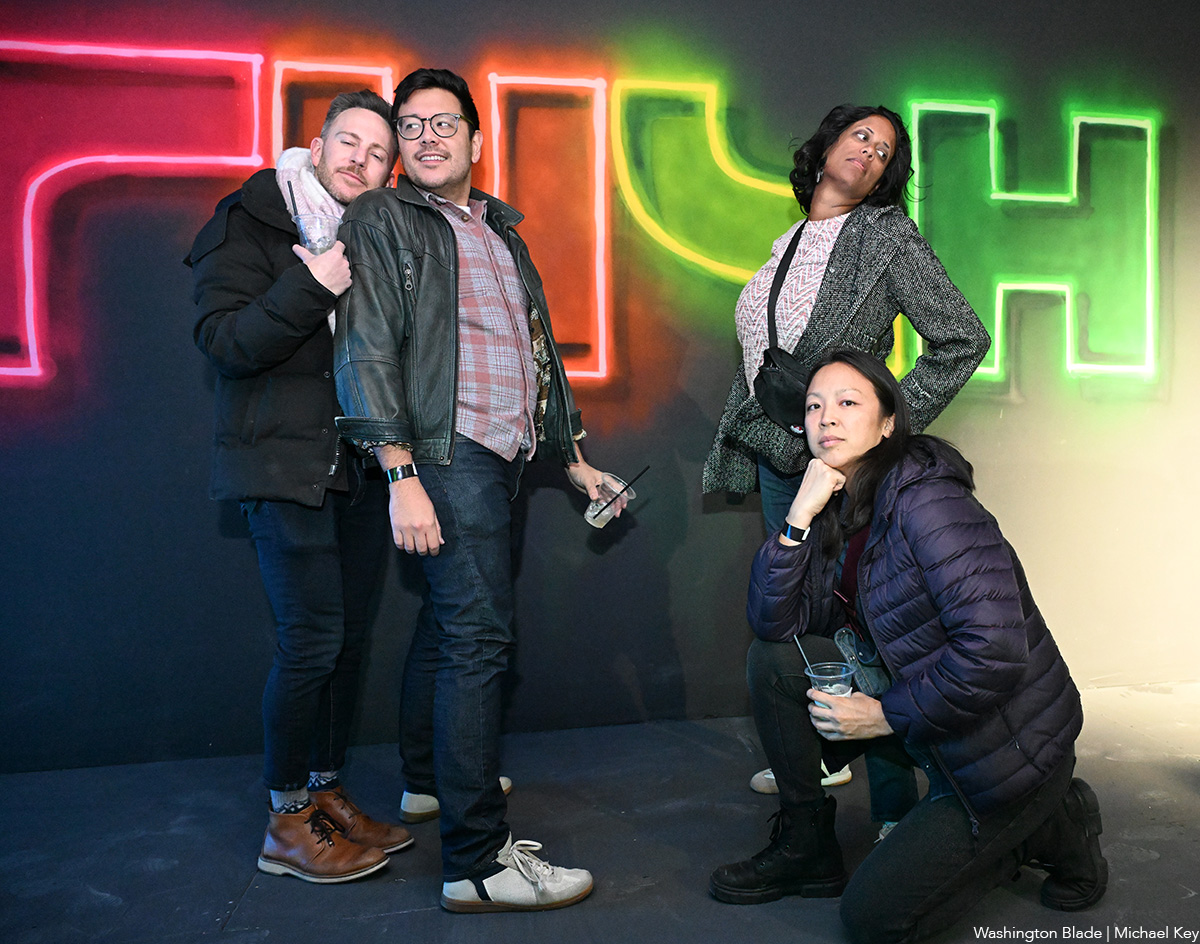
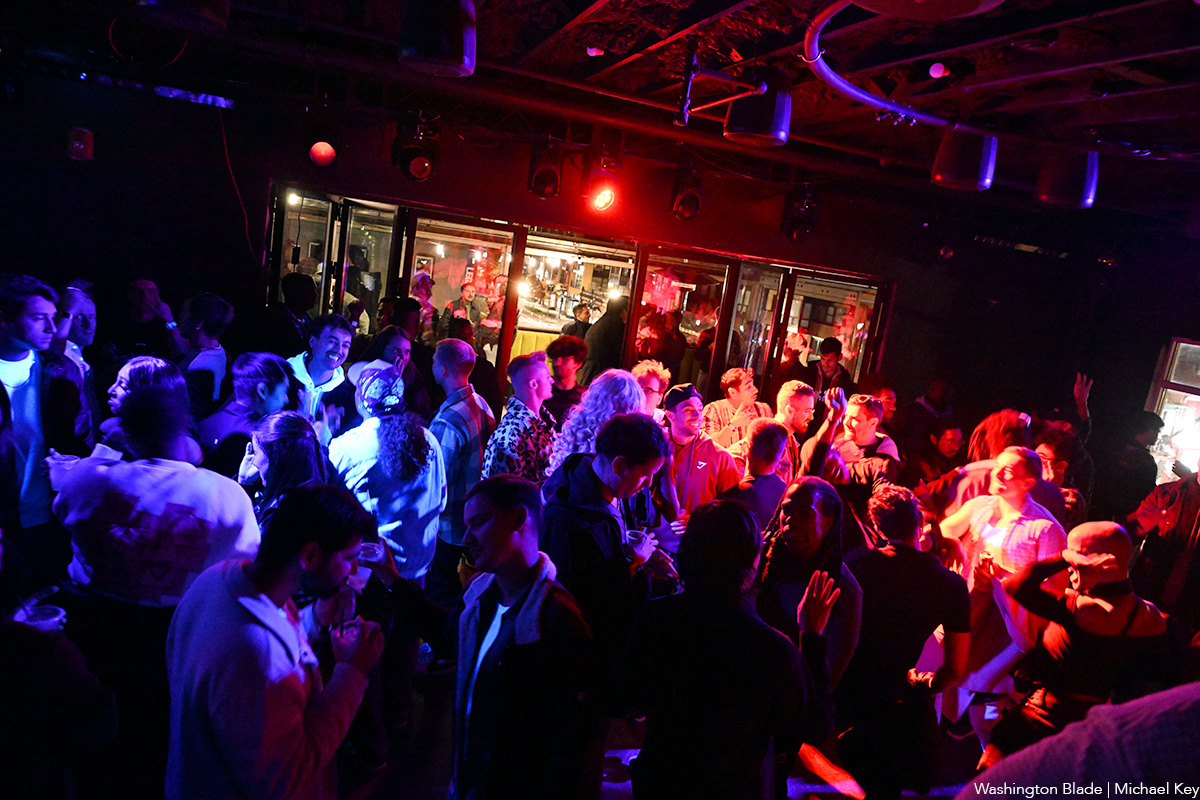
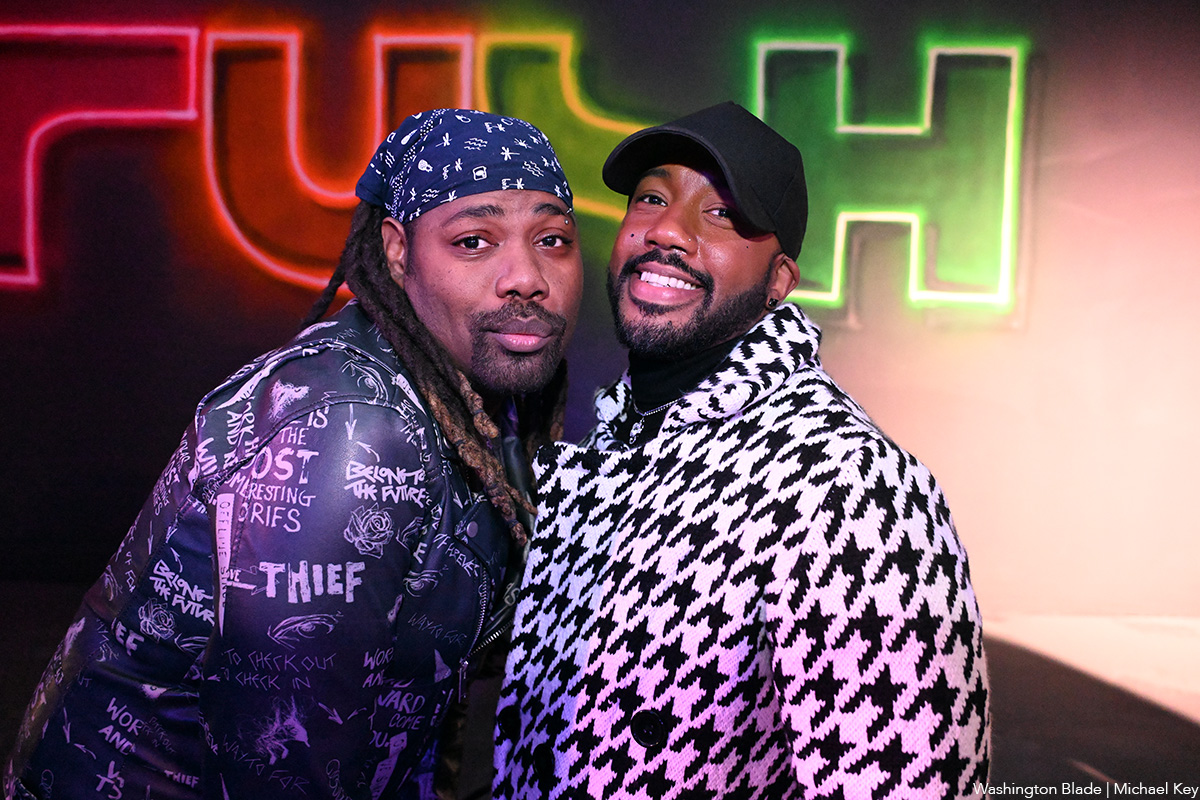
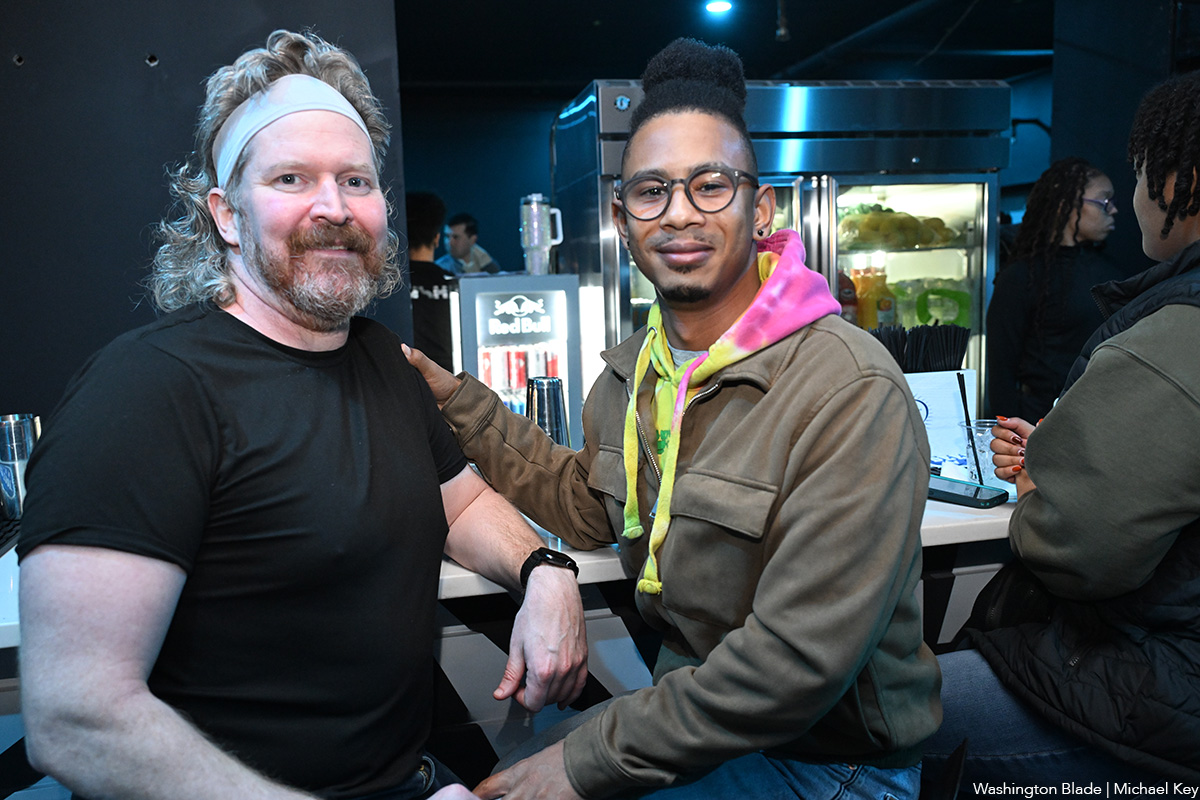
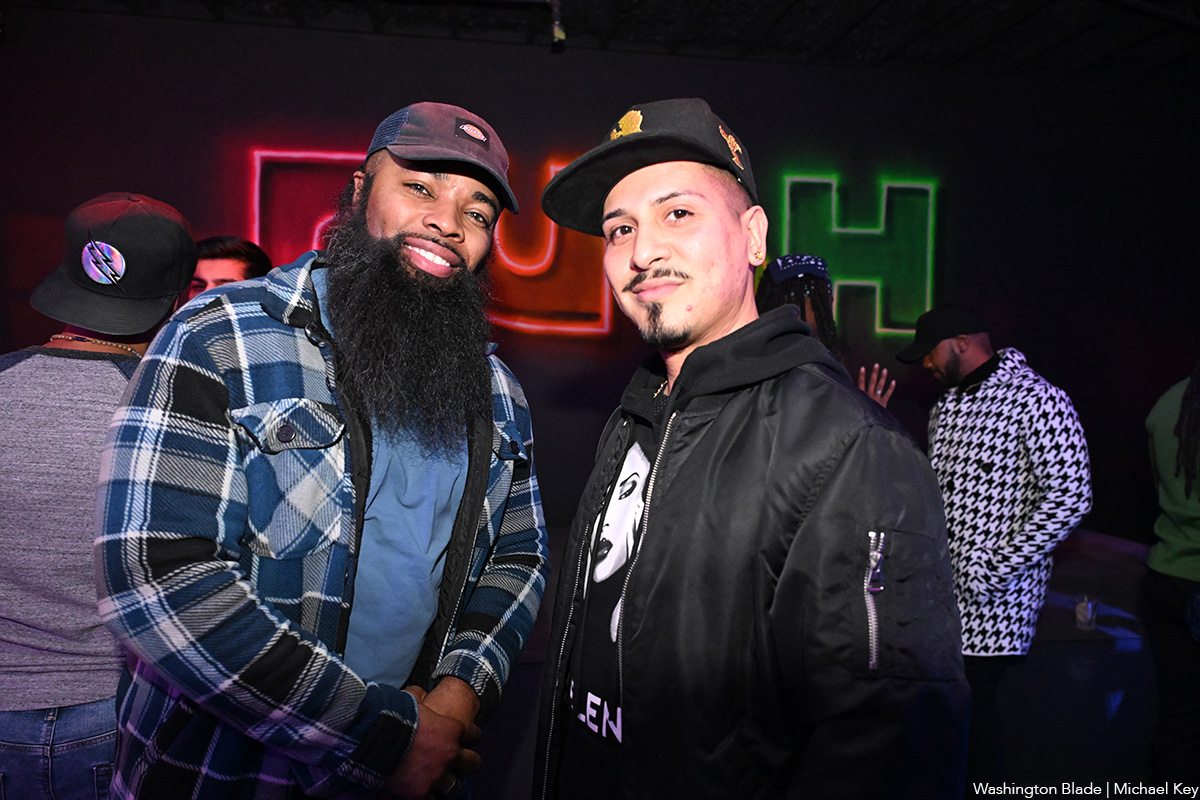
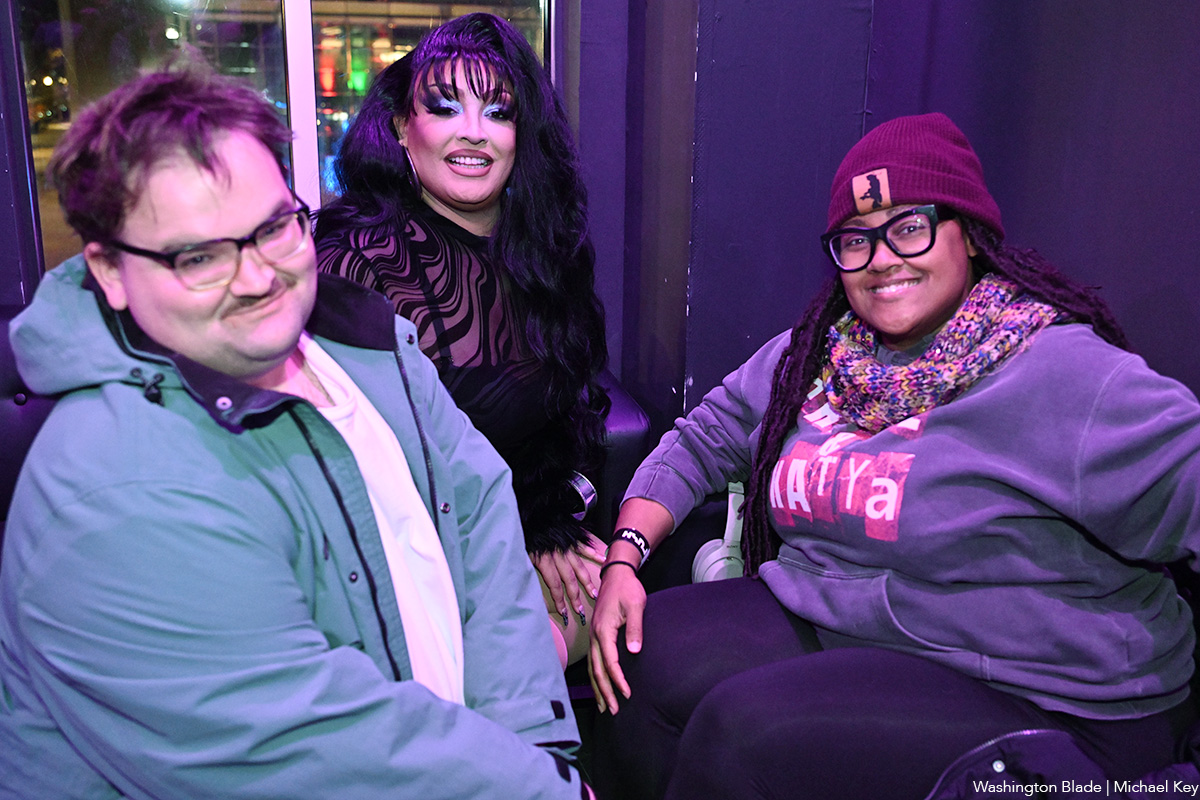
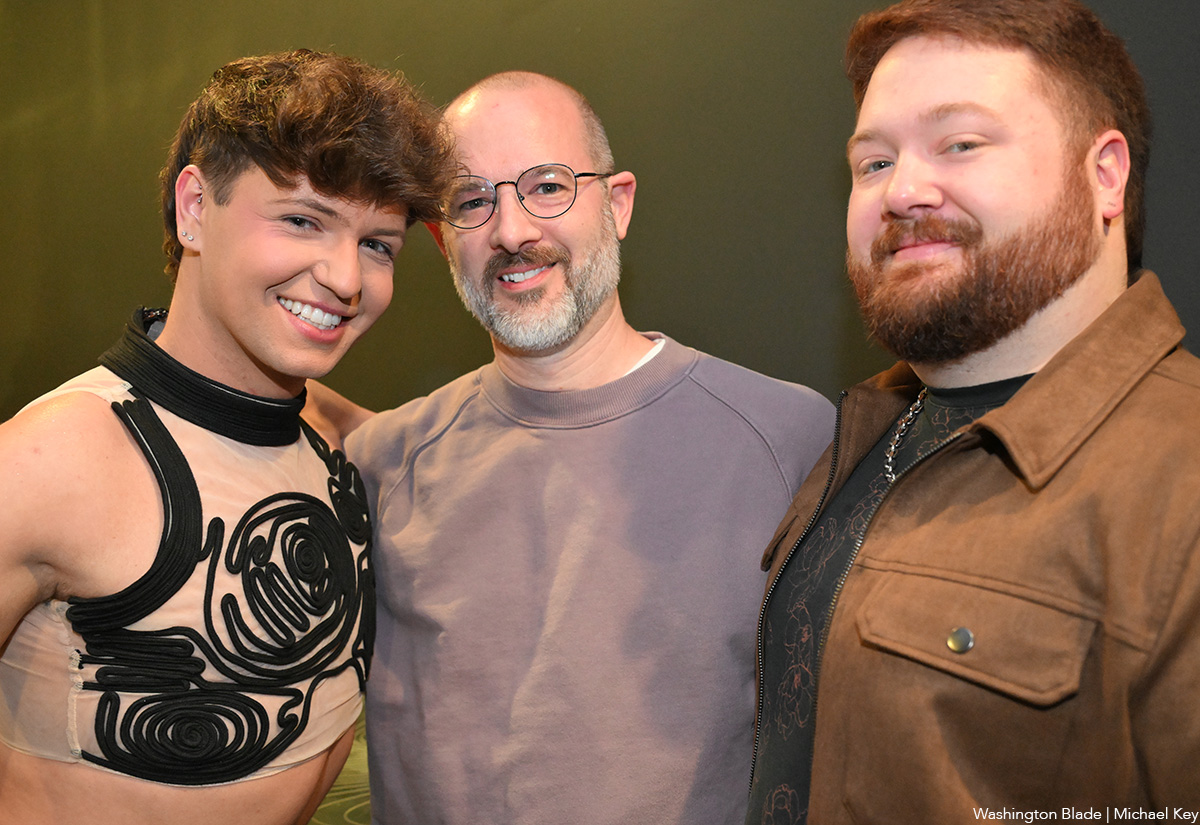
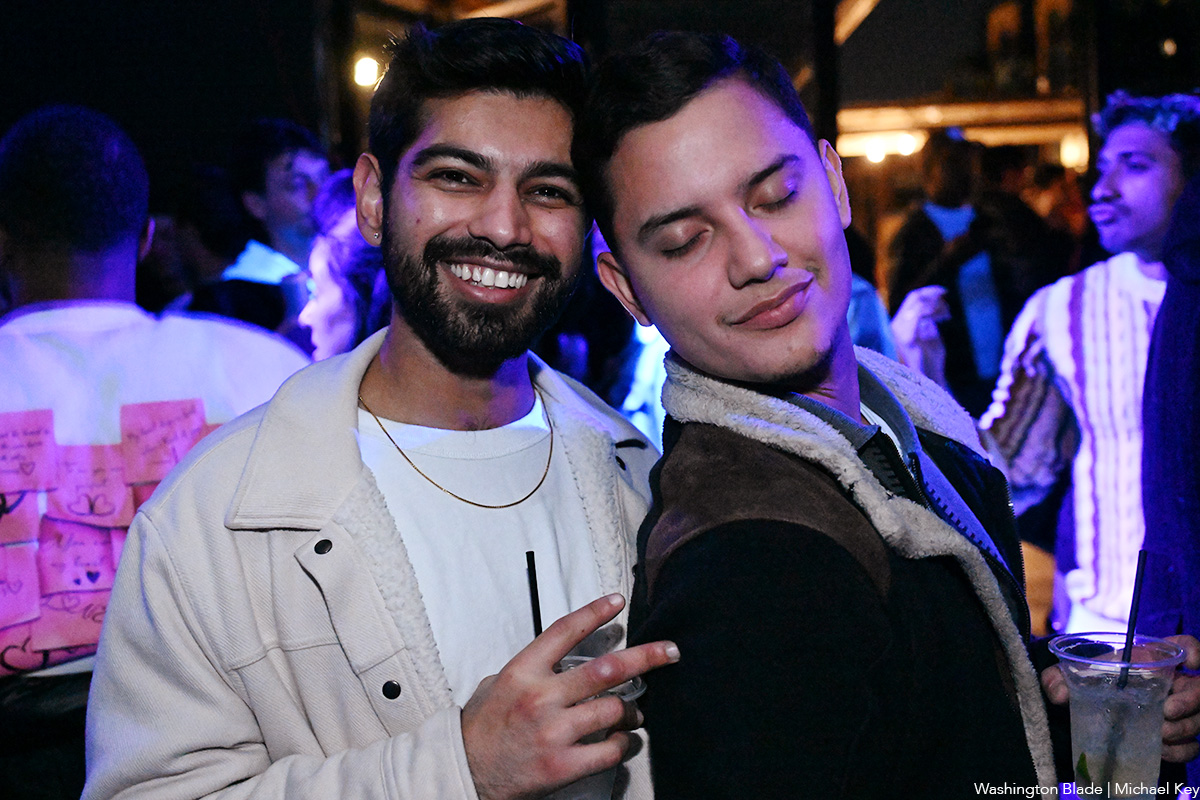
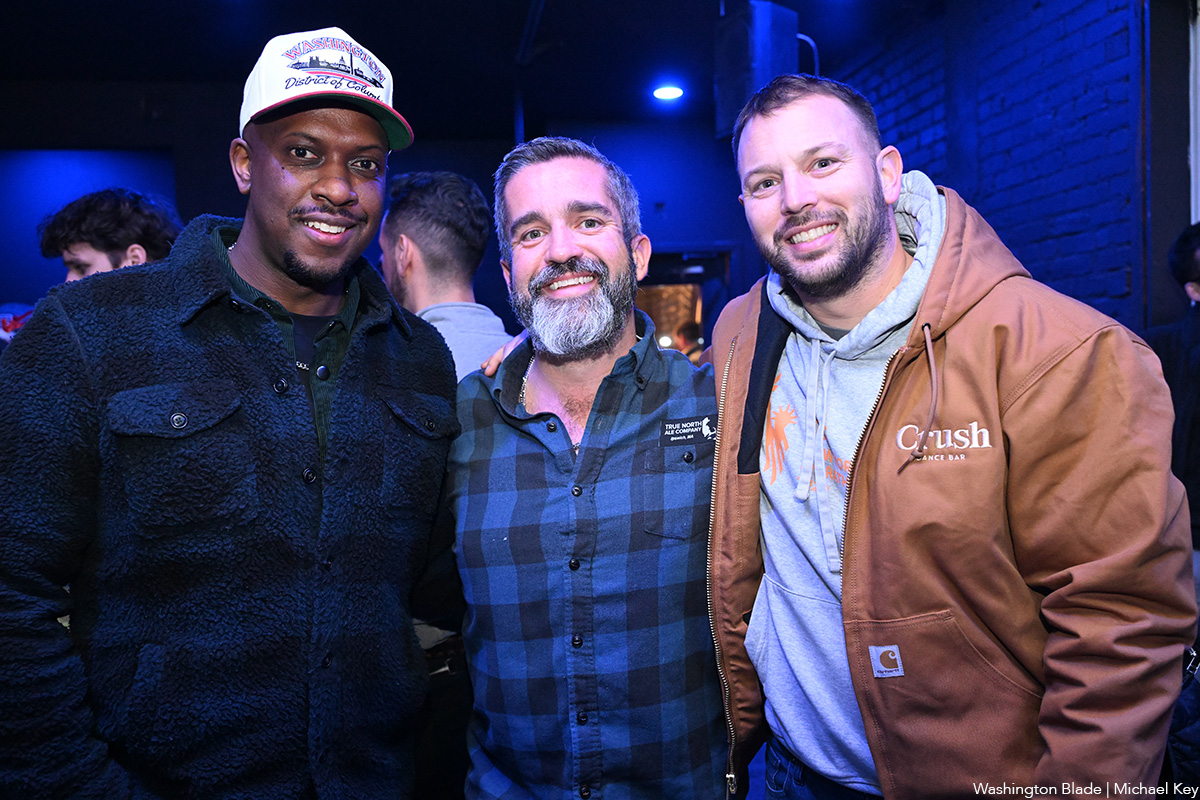
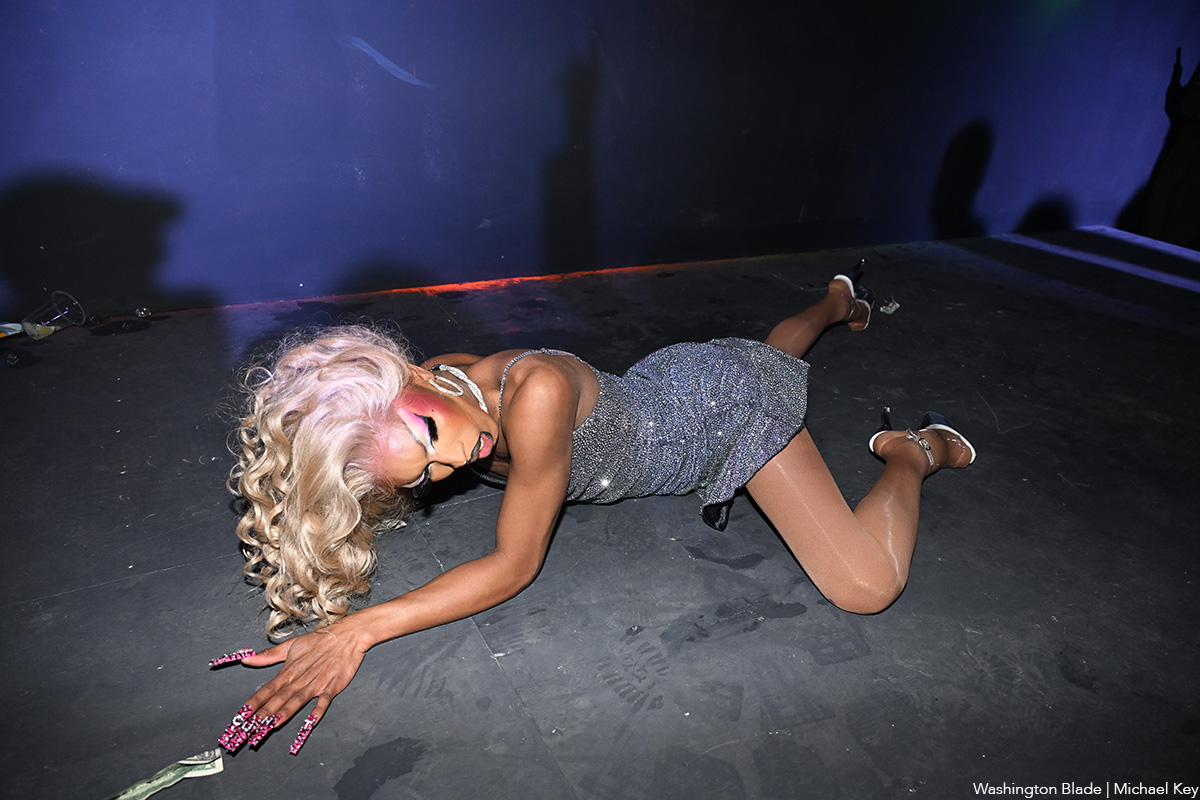
Movies
Holiday movie season off to a ‘Wicked’ good start
From Hallmark to horror, something for all tastes
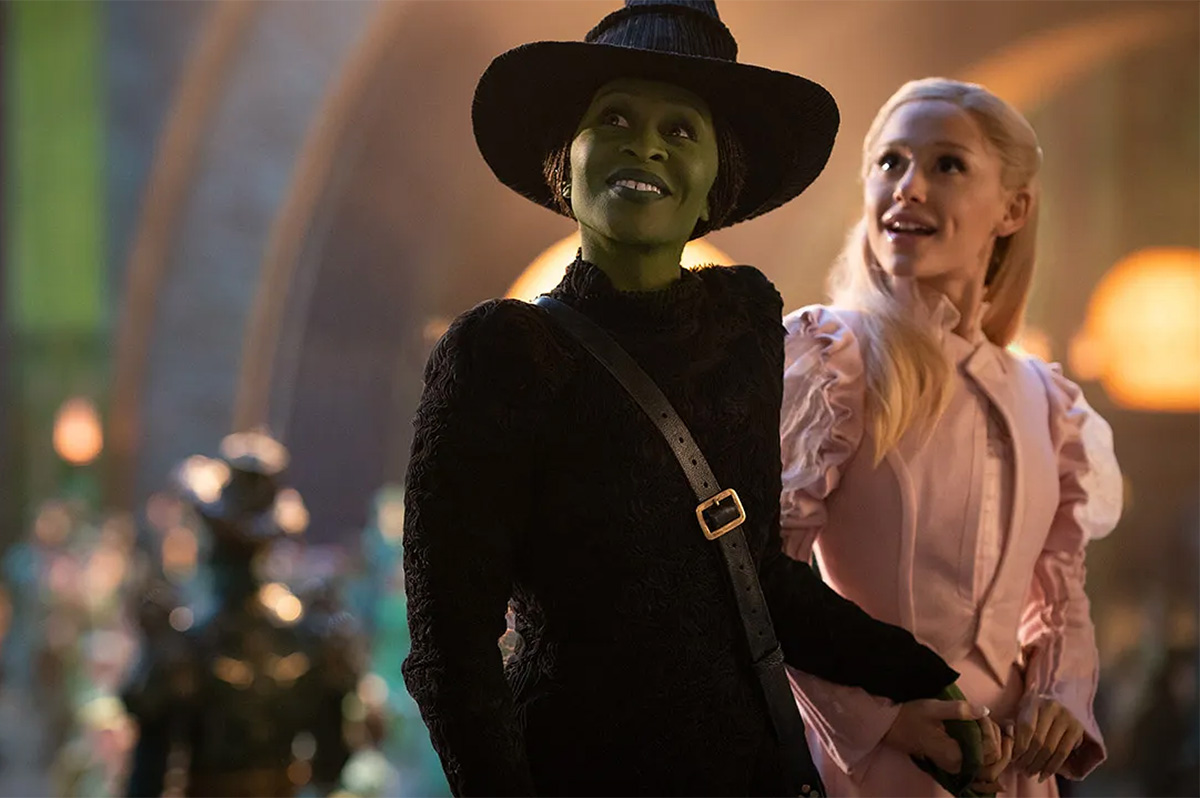
With Christmas just around the corner, it’s time to look ahead to the movies headed our way for December – and just like last year, the perfect film to launch it all is already here.
We’re talking, of course, of “Wicked: For Good” (now in theaters), the follow-up to last year’s smash adaptation of the hit Broadway musical that turns the witchy mythos of “The Wizard of Oz” inside out. A continuation rather than a sequel, director John M. Chu’s sumptuously crafted epic adapts the show’s second act to conclude the saga of green-skinned Elpheba – branded as a “wicked” witch by the authoritarian Wizard (Jeff Goldblum) for her rebellion against his suppression of Oz’s animal population – and her complicated relationship with “frenemy” Glinda (Ariana Grande-Butera), who is now serving as a sort of “double agent” by working to change the regime from within. As with the movie’s source material, there’s a definite “second act slump,” which Chu and co-screenwriters Winnie Holzman and Dana Fox attempt to counter with some minor retooling of the plot, incorporating more material derived from the Gregory Maguire novel that inspired it all, and adding a couple of new, original songs; it works, to a large degree, but the second half still lacks the bubbling sense of joy and excitement that made the first such an infectious hit.
Still, that’s just a quibble – and while this one may not leave us as giddy, it’s a worthy completion of the project, arguably improving the show by granting it levels of emotional resonance, political subtext, and overall depth that always seemed to be the missing element to the material. As for the cast (which also includes first out gay “sexiest man alive” Jonathan Bailey, alongside Michelle Yeoh, Marissa Bode, Ethan Slater, and Bowen Yang), they all continue to deliver powerhouse performances, breathing the kind of fully developed life into their fantastical characters that makes them all stick with us after the final high note is sung. So never mind the inevitable letdown that comes with the splitting of the story into two parts – taken as a whole, Chu’s “Wicked” saga is still a cinematic triumph that, frankly, very few of us expected it to be, and that’s hardly a reason to be disappointed.
As for the rest of the holiday season, there’s not much in the way of directly LGBTQ content coming to our screens – but there are still plenty of promising titles for us to look forward to.
Cutting to the chase for fans of the “Queer Christmas Romance” genre, we’re happy to report that Hallmark – the reigning champion of such fare – has two queer holiday entries lined up for you this season. First up is “A Keller Christmas Vacation” (Hallmark+, now streaming), a quirky tale of three adult siblings on a holiday cruise with their parents in Europe, each dealing with their own personal issues as they find “unexpected joy, romance, and family bonds” along the way – and gay heartthrob Jonathan Bennett, who’s pretty much become the poster boy for this genre, stars as one of them, with former Superman Brandon Routh providing extra eye candy for good measure. The second is “The Christmas Baby” (Hallmark, 12/21), starring Ali Liebert and Katherine Barrell as a lesbian couple who get a holiday surprise when they find a baby on their doorstep; they decide to adopt – which, naturally, requires them to negotiate the process of balancing their relationship and careers with the challenge of being new moms.
There’s also “The Christmas Writer” (Tello, now streaming) in which a lesbian romance author (Shelby Allison Brown) returns to her hometown in search of some Christmas spirit after the death of her mother, an ugly breakup, and a bad case of writer’s block. What she finds is a single lesbian mom (Callie Bussell), and flying sparks ensue.
For heartwarming Christmas cheer without the romcom trappings, there’s “Oh. What. Fun.” (Prime Video 12/3), which serves up Michelle Pfeiffer as a mom and grandma whose knack for putting on the perfect holiday gathering is taken for granted by her self-absorbed family – until they leave her behind on a family outing, forcing them to pull it together themselves. Pfeiffer leads an ensemble cast that includes co-stars like Eva Longoria, Felicity Jones, Denis Leary, Danielle Brooks, Jason Schwartzman, Maude Apatow, Joan Chen, and Chloë Grace Moretz as the queer daughter whose vegan girlfriend throws a last-minute wrench into the dinner menu. Sounds relatable!
Not holiday-themed but still a gift, “Merrily We Roll Along” (limited theaters 12/5) is the multiple-Tony-winning 2023 Broadway revival of Stephen Sondheim’s musical that tells the story – in reverse – of three high school BFFs as their relationship (and their ideals) shift across three decades. Featuring some of Sondheim’s most personal compositions, director Maria Friedman’s production of the show (starring Jonathan Groff, Daniel Radcliffe, and Lindsey Mendez) was immersively captured on film before closing in 2024 – and now, it’s on its way to movie screens as a special holiday treat for musical theatre lovers.
Likewise unseasonable and just as intriguing is “100 Nights of Hero” (limited theaters 12/5), an adaptation of the graphic novel by Isabel Greenberg (itself based on the classic folk tale “1,001 Nights”) in which a woman (Maika Monroe) is left alone by her neglectful husband (Amir El-Masry) for 100 nights at the estate of his seductive friend (Nicholas Galitzine, “Red, White, and Royal Blue”) as a test of her fidelity, with only her loyal maid (Emma Corrin, “The Crown”) as an ally. A sexy and stylish period fantasy with a queer-inlusive cast, it comes with buzzy acclaim from its Venice Film Fest debut, so we’ve definitely got this one on our list.
Kristen Stewart fans will be excited to see the debut of “The Chronology of Water” (limited theaters 12/5), the queer screen queen’s first film as producer, director, and co-writer. Adapted from Lidia Yuknavitch’s memoir, it stars Imogen Poots as a woman who overcomes personal trauma through her writing, and earned a lengthy standing ovation at its Cannes premiere earlier this year. The release is limited, with a wider expansion in early 2026 – but we’re confident it will be worth waiting for, if you have to.
“Hamnet” (Theaters, 12/12), from Oscar-winning director Chloé Zhao, delivers a speculative slice of behind-the-scenes history with a period tearjerker about William Shakespeare (Paul Mescal) and his wife, Agnes (Jessie Buckley), as they struggle to cope with the death of their 11-year-old son – a real-life tragedy that inspired the playwright in his creation of “Hamlet.” Advance reviews have offered high praise for this one, especially regarding Buckley’s performance; but as his fans know, Mescal is no slouch either, and they’ll no doubt be standing in line for this one whether they’re interested in Shakespeare or not. Emily Watson and Joe Alwyn also star.
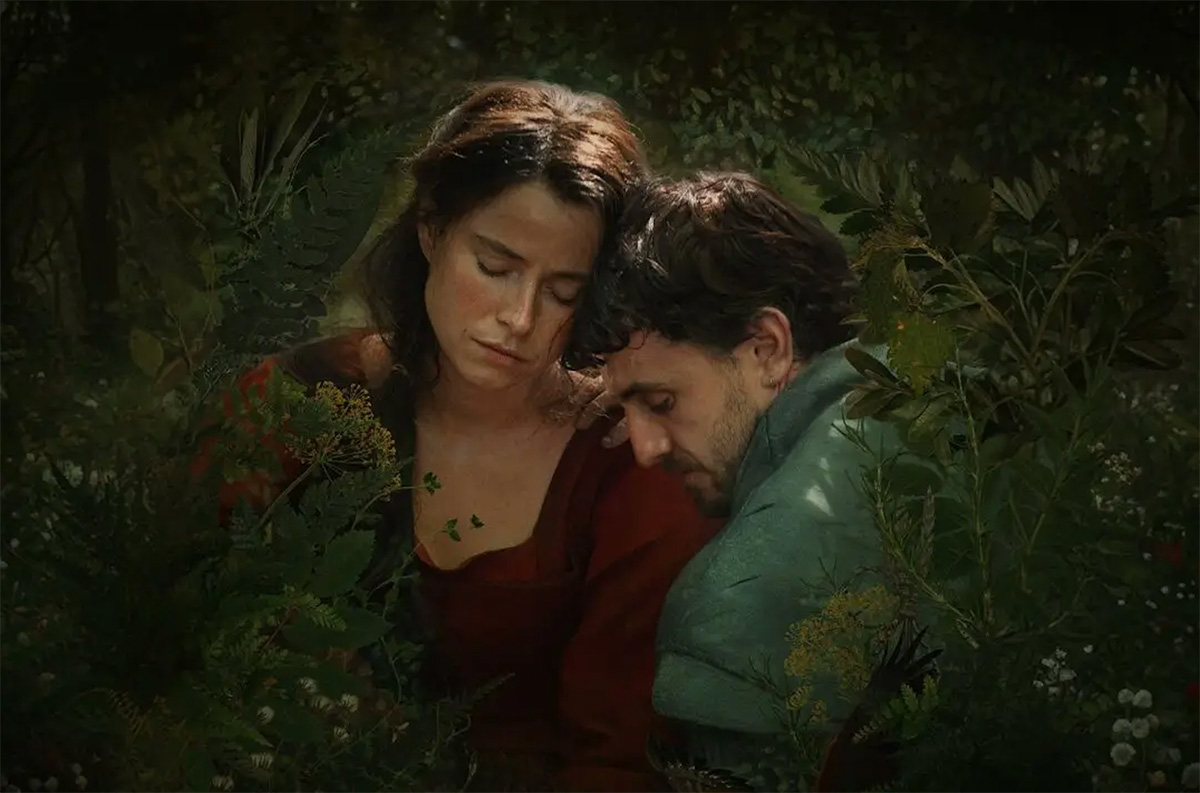
It’s been 15 years since iconic producer/director James L. Brooks has made a movie, but the “Terms of Endearment filmmaker is back this month with “Ella McCay” (theaters, 12/12), a political dramedy set in the Obama era, which follows a young Lieutenant Governor (Emma Mackey) as she prepares to take over after her boss and mentor (Albert Brooks) accepts a Cabinet position with the new administration. Also featuring popular and prolific queer ally Jamie Lee Curtis, alongside Jack Lowden, Kumail Nanjiani, Ayo Edebiri, and Woody Harrelson, it’s sure to be a highlight of the season – after all, besides all his movies, Brooks is the man responsible for “The Mary Tyler Moore Show” and “The Simpsons,” so the track record speaks for itself.
Daniel Craig returns for one more round as Master Detective Benoit Blanc in “Wake Up Dead Man: A Knives Out Mystery” (Netflix, 12/12), the third installment in filmmaker Rian Johnson’s series of all-star comedic “whodunnits” that both spoof and pay homage to the classic murder mystery genre defined by Agatha Christie and other authors of her era. This time, the eccentric gay detective investigates a murder within a devout church community centered around a charismatic priest (Josh Brolin), in what’s described as “his most dangerous case yet,” and the list of suspects includes Josh O’Connor, Glenn Close, Mila Kunis, Jeremy Renner, Kerry Washington, Andrew Scott, Cailee Spaeny, Daryl McCormack, and Thomas Haden Church. If it’s even half as diabolically clever as the first two films, it’s bound to be a fun ride.
Screen icon Kate Winslet makes her directorial debut (from a screenplay by her son, Joe Anders) with “Goodbye June” (limited theaters 12/12, Netflix 12/24), a Christmas-set British drama about a family that gathers around its ailing mother (Helen Mirren) as she prepares to face the end of her life on her own terms. Inspired by the personal experiences surrounding the death of Winslet’s mother from ovarian cancer, some audiences might find the subject matter too much of a downer for the holiday season, but a light-hearted and positive tone – along with an ensemble cast that includes Toni Collette, Johnny Flynn, Andrea Riseborough, Timothy Spall, and Winslet herself – is likely to take the edge off for those willing to include a touch of bittersweet flavor in their holiday season.
For those who love the immersive, imaginative spectacle of James Cameron’s “Avatar” franchise, “Avatar: Fire and Ash” (theaters, 12/19) makes its eagerly awaited debut this month, with a third installment that sees the Na’vi people enmeshed in further struggle with exploitative humans from Earth – which gives the phrase “it’s going to be a Blue Christmas” a whole new meaning. The cast includes returning players Sam Worthington, Zoe Saldaña, Stephen Lang, Sigourney Weaver, CCH Pounder, Giovanni Ribisi, Kate Winslet, Cliff Curtis, Edie Falco, Jemaine Clement, and multiple other veterans of the series.
Because sometimes you need a creepy psychological thriller to offset all the seasonal sweetness, versatile director Paul Feig’s “The Housemaid” (Theaters, 12/19) gives us Sydney Sweeney as in the title role, who takes a job as live-in servant to a wealthy woman (Amanda Seyfried) and her family, and slowly begins to discover the dark secrets lurking behind her new employers’ seemingly perfect life. Brandon Sklenar, Michele Morrone, and Elizabeth Perkins also star.
With “Father Mother Sister Brother” (limited theaters 12/24), acclaimed cult filmmaker Jim Jarmusch re-emerges with an anthology movie that follows three estranged family relationships in three different countries around the world. Its ensemble cast features Tom Waits, Adam Driver, Mayim Bialik, Charlotte Rampling, Cate Blanchett, Vicky Krieps, Sarah Greene, Luka Sabbat, and transgender actress Indya Moore (“Pose”) – and oh, by the way, it won the Golden Lion at this year’s Cannes Film Festival, so cinema enthusiasts are especially advised to consider it a “must-see” for their holiday season.
Finally, if you’re a member of the “Cult of Chalamet,” you’re probably already looking forward to “Marty Supreme” (theaters 12/25), in which the gifted young “It Boy” actor plays an ambitious ping pong player who “goes to hell and back” on his path to becoming a champion in the sport. Loosely based on the story of real-life table tennis champion Marty Reisman, it’s helmed by acclaimed director Josh Safdie (“Uncut Gems”) and co-stars Gwyneth Paltrow, Odessa A’zion, Kevin O’Leary, Tyler Okonma, Abel Ferrara, Sandra Bernhard, and Fran Drescher – but let’s face it, it’s going to be all about Timothée, and we’re perfectly fine with that.
With all those titles to choose from, we’re pretty confident you’ll have enough to keep you entertained until next year, when we can look forward to thrilling new releases like the much-anticipated “Pillion,” with Alexander Skarsgård – but we’ll have more on that for our next preview. For now, enjoy the seasonal offerings already on your plate.
Happy holidays!
-

 The White House2 days ago
The White House2 days ago‘Lavender Scare 2.0’: inside the White House’s campaign against LGBTQ federal employees
-

 District of Columbia3 days ago
District of Columbia3 days agoHIV/AIDS activists block intersection near White House
-

 Movies4 days ago
Movies4 days agoHoliday movie season off to a ‘Wicked’ good start
-

 District of Columbia2 days ago
District of Columbia2 days agoActivists praise Mayor Bowser’s impact on city, LGBTQ community





